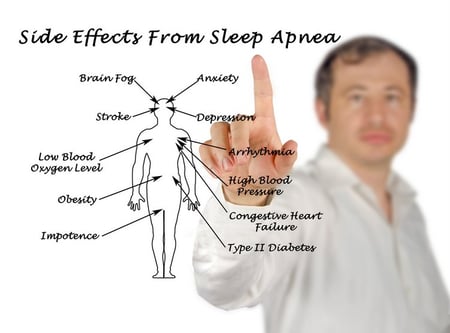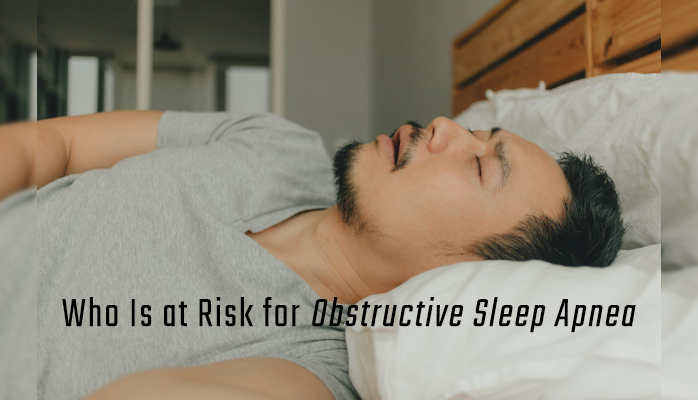What is Obstructive Sleep Apnea?
Obstructive sleep apnea (OSA) is a disruptive and potentially dangerous sleep disorder that interrupts your breathing multiple times throughout the night, typically for around 20 seconds at a time. These interruptions, known as apnea events, force your body to wake up and start breathing again, preventing you from achieving restful sleep and leading to significant sleep deprivation. The consequences of OSA can be profound and have a negative impact on your overall well-being. While some individuals may be at a higher risk for developing OSA, it's important to assess whether you could be susceptible to this condition.
Apnea events can occur as frequently as 40 times per night for those with mild sleep apnea, and over 240 times per night for individuals with severe sleep apnea. Interestingly, you won't have any recollection of these events in the morning. Regardless of whether you experience 50 or 150 instances of interrupted breathing during the night, the end result is chronic sleep deprivation.
The point is that the consequences are largely the same, the difference may only be the severity of the symptoms and rapidity of damages done.
While there are many potential consequences, they are all related to causing:
- A shortened lifespan
- A lower quality life
- Medical complications
There are various factors that will put you at risk for developing OSA, including:
- Medical and biological risk factors
- Physical risk factors
- Lifestyle risk factors
Let’s look at these risk factors in more detail.
Symptoms of Sleep Apnea
 Before we look at risk factors, it’s important to note what the telltale symptoms of sleep apnea are [WebMD]:
Before we look at risk factors, it’s important to note what the telltale symptoms of sleep apnea are [WebMD]:
- You repeatedly stop breathing throughout night, and rouse waking/gasping
- You suffer from loud, chronic snoring
- You wake up exhausted in the morning
- You wake up with headaches
- Excessive daytime sleepiness
- You wake up with excessive dry mouth with regularity
- You suffer from irritability chronically
- You have a reduced sex drive or struggle with ED
- You suffer from a number of other sleep deprivation symptoms
Obstructive sleep apnea may go undiagnosed because you won’t notice some of the telltale signs, such as not breathing at night and snoring loudly.
Biological and Medical Risk Factors for Obstructive Sleep Apnea
There are certain medical and biological factors that increase your risk for developing OSA. They include the following:
- Having diabetes
- Genetics/family history
- Having certain medical conditions that cause sleep apnea (rare)
- Requiring certain medications for health reasons (such as pain relievers)
- Age/Sex (older men are most common demographic for sleep apnea)
- Having high blood pressure
- Chronic nasal congestion
Physical Risk Factors for Obstructive Sleep Apnea
Physical risk factors for obstructive sleep apnea describe the physical attributes of your body. You may have some control over these, such as with your weight. You may not have control over these factors, such as having a small airway.
Here are primary physical risk factors that may influence the development or severity of OSA.
- Being overweight or obese
- Having a thick or large neck
- Having smaller airways in your throat, nose or mouth.
- Having enlarged tonsils
- Having a deviated septum
- Having a large tongue
Lifestyle risk factors for sleep apnea
Though medical and physiological risk factors can play a large role in developing OSA, lifestyle factors also can spark the onset of OSA. Some lifestyle factors linked to OSA include:
- Sleeping on your back
- Smoking
- Drinking excess alcohol
- Narcotic use (i.e., painkillers)
Fortunately, unlike medical and physiological risk factors, which may require medical intervention such as CPAP therapy, lifestyle factors may treated on their own by things like:
- Changing sleep position
- Quite smoking/drinking
- Find alternative medication to narcotics
Treatment for Sleep Apnea
Most individuals with sleep apnea find relief through CPAP therapy, a treatment that involves the use of CPAP devices to provide continuous positive airway pressure. Surgery is typically not necessary in the majority of cases.
For mild cases of sleep apnea, non-medical interventions may be recommended by your doctor.
If you live in Alaska and need to confirm a sleep apnea diagnosis, please contact us to get a sleep study by clicking the orange button below to take a free online sleep test.


